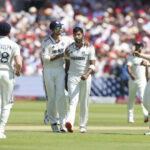This is an audio transcript of the Life and Art from FT Weekend podcast episode: ‘Culture Chat — The glory and controversy of the Olympics’
Katya Kumkova
Welcome to Life and Art from FT Weekend. I’m Katya Kumkova, I’m in for Lilah Raptopoulos and this is our Friday chat show. Today we’re talking about the Paris Olympics. The Games opened last Friday with a rainy outdoor ceremony that included historical references, a heavy metal band, drag queens, and some sexual innuendo. It was actually a pretty incredible spectacle, though since then, it’s gotten a lot of pushback, both in France and outside of it. These Games are being hailed as the first sustainable Olympics because a lot of the structures that were built are gonna come down. It’s the first Olympics to have gender parity among participants, or so we’re told. And of course, there are a lot of exciting sporting events to look forward to, including the brand new sport of breaking, which you may know is breakdancing. So today we’re gonna talk about what to expect and what it all means. I am Katya, I’m sailing in on a flotilla of boats. With us today, joining me from Paris is our gold medallist, Paris bureau chief Leila Abboud. Hi, Leila.
Leila Abboud
Hello.
Katya Kumkova
And also in Paris is big girl Sara Germano. Sara is the FT’s US sports business correspondent. Hi, Sara.
Sara Germano
Hi. Is this where I say: Yo, yo, yo.
Katya Kumkova
Yo, yo, yo. Yes. Perfect. OK, well, let’s hit the scene first. We’re few days in. How are you feeling about the Olympics? What’s the mood? What’s your guy’s mood? Sara, let’s start with you. How are you feeling going into it?
Sara Germano
Sure. I am, honestly, this is my sixth Olympics, which I don’t say as a humblebrag as much as it . . . which is some context for having been to other Games in Sochi and in Rio, and then the Covid Olympics in both Tokyo and Beijing. Big range of experiences. Right? And there’s a feeling of coming to Paris and we are, you know, a reopened world, fans are back in the stands, people are feeling good. The crowds have been excellent and really enthusiastic for the events that we’ve attended so far. Even the opening ceremony, which I know we’ll get to shortly, everyone was in really good spirits, so I have high marks so far.
Katya Kumkova
Cool. Leila, how about you? I know that you live in Paris. Is it as exciting or is it just kind of annoying that there are so many people?
Leila Abboud
Well, this is my first Olympics. And honestly, I’m jealous of Sara that she’s gotten to do so many of them. I mean, I’m sort of a closet sports fan, so I’m sort of inclined to be psyched about the Olympics, and now I’m getting to go see them in the most privileged way. Journalists like me and Sara who were accredited to cover the Games can pretty much go as we please and to pick the events that we want to attend without, like, signing up or anything.
On the annoyance factor in the city, there’s been a lot of grumpiness in the run-up, Parisians, mostly for Parisians, but to be honest, it hasn’t actually been that bad. I think it’s because a lot of people just hightailed it out of town to go on vacation because this is, you know, the sacred, summer holiday season for the French anyway. And I do think that the concept of the Games that they’ve put up, which is basically to have these picture postcard events at all the Paris monuments, like, it’s pretty cool. You have to be sort of a grump to not be into it.
Katya Kumkova
Can I ask you guys, both of you, I mean, Sara, this is, obviously sports is your bread and butter. But I’m curious, what is your relationship with the Olympics?
Sara Germano
My thought about it is that I find it kind of unbelievable how engaging they are. And it must tap into something that, you know, goes back to early childhood or something like that. You know, I imagine myself watching the Olympics with my grandparents because I didn’t prepare, I didn’t look anything up, I didn’t know who was against who, what were the big kind of match-ups. And then I found myself watching this weekend beach volleyball game, where it was two-on-two and I didn’t know that was a sport. It was the Czech Republic and the US, these two women on either side. And I was hooked. So, yeah, there’s something about it that really, I was just hooked in. So, Leila, I don’t know. What’s your relationship with the Olympics?
Leila Abboud
I mean, I can remember watching when I was a kid. I grew up in America, and the Olympics are like, they occupy prime time TV, but I’m not, like, totally jacked into the Olympics, except for now when I’m sort of living and breathing it this year. The thing which kind of ends up being a bit magic about it is there’s still these sort of weird sports you don’t even realise that people dedicate their lives to, like fencing and archery and, you know, there’s table tennis and all these things, which like the guys are just, they spent their whole lives, probably sacrificed much of their social and educational lives in order to be here. And that in of itself is just pretty cool. And then just having a bunch of different big sporting events in the city at the same time.
So today, Sara and I went to Roland-Garros, which is usually where the French Open is held. It’s one of the Grand Slam tennis tournaments. And I’ve been going to that for like 15 years, but now we’re getting like an extra little mini Roland-Garros because it feels exactly the same. All the big players are there and then you have some amazing match-ups, like Rafael Nadal is playing doubles with this player, also Spanish, called Carlos Alcaraz, who’s basically his heir-apparent, like Nadal is moving off the stage and Carlos is, you know, taking his spot in kind of the pantheon of tennis. I would say that this has augmented my affection for the Olympics. So I’ll probably be, you know, happy to watch more later.
Sara Germano
Yeah. It is really remarkable. Basically, every day there are dozens of events going on, which means that dozens of people are probably having one of the best days of their lives, right? Like they’re winning or they’re, you know, advancing in their heat, they’re setting world record. They’re making their friends and family proud. And it’s just, it’s a nice energy to be around. So you kind of feel that. So like, it just kind of imbues the city with a little extra room.
Katya Kumkova
Right. And obviously it doesn’t hurt that they put together the super elaborate opening.
Leila Abboud
Yes. I mean, the ratings for the opening ceremony were crazy high. It was like 80 per cent of the population tuned in to watch it. In part because there was an absolute crazy hype machine in like the past two years about this crazy ceremony they were gonna do. And when it works, I think everybody just wanted to watch it. And then it was almost as fun the next day to sit around and debate whether you liked it or not. The French are also very, very, very happy about the closing of it, the last song by Celine Dion on the Eiffel Tower. She’s this beloved Canadian singer who the French just fall over themselves in love with. So everyone is, like, really happy to see her.
Katya Kumkova
Yeah, I think everyone was just waiting for that moment.
Leila Abboud
Yeah.
[MUSIC PLAYING]
Katya Kumkova
OK, so I want to move on now and talk a little bit about the politics of the Olympics. You know, it’s a global event. Everyone’s kind of projecting something. And maybe we start with talking about France itself, for which we probably want to go back to the opening ceremony again and all the hubbub around it. So, Leila, can I ask you in a few words to tell us what it’s all about? Why did the organisers have to apologise for the ceremony? And what does it have to do with kind of the political divisions in France right now?
Leila Abboud
I mean, the ceremony was insane. It was basically like a parade of boats with all the athletes along the Seine. And then the theatre director, this man named Thomas Jolly, who created it, sort of thought about the ceremony in 12 different, like, tableaux. Right? So it would go along and maybe do separate performances, dancers, theatre, whatever. And one of them was this very intricate dance on a bridge with a light show, and it kind of was meant to be like a fashion catwalk, with all the people prancing up and down it, and the dancers that were mostly drag queens.
Katya Kumkova
Yeah, yeah, yeah, exactly. And it seems like the really specific thing that people were really mad about, and not just in France, was one particular scene where the drag queens are seated around a table that people thought looked like the Last Supper with Jesus in the middle. Although actually, what we’ve learned since then is that that scene was based on a painting of Dionysus and not Jesus, and that it had nothing to do with the Last Supper.
Leila Abboud
Yeah, there was kind of like a social media storm in the hours after the ceremony because some far-right politicians, kind of all over the world, started expressing anger about this opening ceremony that they felt was some sort of — and I’m gonna put air quotes around this — sort of woke agenda that they felt was not in keeping with the Olympic spirit. And honestly, I think this is like a silly culture war episode that gets whipped up by social media. And no one here, actually, very few people are paying attention to this. They did some polling. A French polling agency did quite a simple poll asking maybe a panel of a thousand French people what they thought of the opening ceremony. And I think the number was like, it’s three-quarters of the population, which was either, you know, really liked the ceremony or just sort of like the ceremony.
Sara Germano
Can I also just say, like, you know, the point of the opening ceremony is to showcase the culture and the values of the host, and that’s not necessarily the culture and the values of everyone in the world. It’s supposed to celebrate France. It’s supposed to celebrate, you know, their people and their values. And, you know, I’m the straight man here. Like, I, don’t live in France. I’m not French. I was watching it with, you know, fresh eyes. And it struck me as a very French celebration. You know, a lot of the touchstones that they referenced, like literature and, you know, free love and . . .
Leila Abboud
Revolutionary spirit. Lots of revolutionary spirit.
Sara Germano
Yeah, revolutionary spirit, all of that. Like, it’s just, it was very French in a way that I was like, even if it’s not something that speaks to my values, I understand it to be the French values. And that in keeping with the tradition of the opening ceremony, it was very authentic.
Leila Abboud
You know, where there was a, you know, the question is, what are French values, right? And the French values, essentially at their core, about humanity, universalism, the idea of independence, you know, liberté, égalité, fraternité. Right? That’s its most basic. Now, we can have endless culture wars over what that means. And that’s how France has been for decades. But French people trying to figure out what they think it means to be French in 2024 is actually something which probably happens in every country, right? But there’s this ongoing sense of trying to figure out what your country’s identity is as it changes both in demographics and technology and, you know, the economy. These are like moving targets. And it’s actually, I want to hear Sara talk about what French values are. There are some fixed points, but there’s also a lot that people see differently through the prism of their own perspective.
Katya Kumkova
Yeah.
[MUSIC PLAYING]
So I want to ask you a question about international politics here. At least that’s what I would normally do. But the weird thing about this Olympics is that it doesn’t feel like it has a lot of geopolitical rivals just duking it out on the mat. Russia’s still banned. China, you know, doing great, but almost doesn’t feel like it needs to prove itself in this way any more. And instead it feels like what has been foregrounded or like the main sort of global issue that’s being foregrounded here is sustainability, which we’ve mentioned a couple of times. And I guess I’m curious, you know, is this serious? Is this a PR thing? Are these Olympics really going to turn the page on wastefulness in putting on the Olympics?
Sara Germano
It is a really interesting question, right? Like Paris is going to be evaluated as sort of a new model for the Olympics, right? If you think over the last 10 years, the Olympics tried to push into new places like Rio de Janeiro, you know, South America. We just came off of a three-string Olympics in Asia, a Beijing Winter Olympics. Right? Trying to expand the audiences. And those Games got criticised a bit because they weren’t very sustainable. They were hugely expensive. There had been resulting controversies in many of those host cities about alleged corruption and whether they were net positive for the local people who, with their tax dollars, helped funded these things. So the IOC, you know, of late has been more conscientious about, OK, let’s maybe try to bring the Olympics back to cities that have hosted before. And where are they going now? Paris. Los Angeles. Salt Lake City was just voted as the next Winter Olympics in 2034, to be decided. And they basically ran unopposed. Because the urban planners and bid committees are conscious of making this a more sustainable event.
Leila Abboud
So France just got the 2030 Winter Games. It will be held in the Alps, and also was relatively uncontested in that process. There had been one other candidate that ended up dropping out at the end, which brings me to another point, which is that the sort of, Winter Olympics, there’s a bit of a sort of sword hanging over that event’s head because according to the IOC, when I talked to them about their sustainability efforts, they do kind of forecasting and modelling with climate scientists to sort of figure out like, what is the range of places that could hold the Winter Olympics. And in their estimations, the pool is just gonna shrink drastically in the next, let’s say, 20 to 30 years. That’s just a fewer number of countries that could hold that event because of rising temperatures.
Katya Kumkova
Wow.
[MUSIC PLAYING]
OK, so finally, let’s talk about sports. Sara, I’m gonna throw this to you as our sports correspondent. What are you looking forward to? What are you watching?
Sara Germano
Yeah, absolutely. I’ll try to give this the most concise overview. There is the return of Simone Biles, who, you may have heard, she is the indisputably greatest gymnast of all time. She’s doing skills that no one has ever done, that no one can complete. And not only is she just an athletic marvel, but that her return to the Paris Games is evocative of her dealing with her mental health and being very transparent about that. So that’s something that a lot of people are excited about. People are really moved by her. Other events that are really exciting, the women’s 100m in track and field, featuring Sha’Carri Richardson and one of the greatest sprinters of all time, Shelly-Ann Fraser-Pryce from Jamaica and her compatriot Shericka Jackson. That’s promising to be a really exciting race. And then later, towards the end of the Games, the women’s 400m hurdles will be a potential world-record race between the current world record holder and gold medallist, Sydney McLaughlin-Levrone of the United States and Femke Bol of the Netherlands. They’re both in great shape, really fierce competitors and it’s promising to be really exciting.
Katya Kumkova
Yeah. So many names, so many people. I mean, I think on the US side, Simone Biles is absolutely like the person that everyone’s looking out for. I think people are excited about Katie Ledecky, the swimmer. Of course in the opening ceremonies, we saw LeBron James and Joel Embiid just hanging out on the Seine. Leila, I guess I’m wondering who are the French excited about?
Leila Abboud
The French have this young swimming star whose name is Léon Marchand, who’s 22, who is basically bidding to be the successor of Michael Phelps, who is the all-time great in US swimming, who won 28 golds and holds a bunch of world records. Léon Marchand is way earlier in his career, but he works under the same coach as Michael Phelps did in America, and he is up for four potential gold medals. And the French have just gone like Léon Marchand-crazy at his first medal event. He just crushed the competition. It was like, it was almost strange to see. I mean, I’m not a swimming expert, but when the guy is like a full couple lengths ahead of the other person and he has time to, like, get up and look around before the other guy even gets there, that seems like a pretty big win.
Katya Kumkova
Yeah, I caught that one. It was incredible.
Leila Abboud
Yeah. So there’s going to be a lot of Marchand mania, put it that way. And then my all-around favourite, but not because I know anything about the sport, is that they’re doing surfing in Tahiti. I don’t know anything about surfing, but the way that they do the commentary with these two very enthusiastic people from French Polynesia who are sitting there like essentially just really simply explaining how surfing works. And when these young surfers are getting out of the water, they just have this coolest attitude, like, they were just rad. I don’t know, they’re, they were like, you know, talking about like feeling the waves. You know, I felt one with the wave. I had to respect the waves. It was out there. But I really enjoyed that. And I think the French are quite proud of having an element of the Games kind of all over the territory.
Katya Kumkova
Yeah, that’s super cool. As a lover of water, I’m very excited about the surfing, although I don’t at all understand how they score it.
Leila Abboud
Well, I learned that basically it’s 30-minute segments and they stay out there for that amount of time. And they . . . There’s multiple surfers on the wave at the same time. And they all have to like compete for waves. So there’s a little bit like strategy of who’s gonna take which one, do block the other person. And whoever gets the highest score at the end of that 30 minutes is the one who wins that round.
Katya Kumkova
Yeah. It’s like a different kind of sport. You’re not going for one wave and how somebody did but, or for one jump or for one whatever. You kind of have to like, really build a narrative about how well everyone is doing over that half an hour. Which makes me want to ask you about breaking, Sara. What should we know going into this new world of breaking at the Olympics?
Sara Germano
It’s a great question. Actually, our colleague Josh Noble travelled to international breaking competition in Budapest to prepare for this and wrote this wonderful dispatch, which you can read in FT Magazine. But apropos of this conversation about the surfing, you know, the judging is so different. The judges themselves are often introduced and, you know, do a performance of their own to kind of establish their legitimacy in the sport before the actual competitors take the stage. And I think the broader thing to know about breaking is that this is part of an ongoing effort by the Olympics to continue to appeal to younger and newer audiences. Right? Like, we think of the traditional sports like track and field and swimming and things that have always been on the Olympic program. And they’re still popular, right? But you want to get new audiences, people who are interested in competing in different events. We see this also with skateboarding. Skateboarding is returning for its second Olympics, and we have defending medallists from Tokyo who are still teenagers. When children watch this, they can see someone their own age competing at the Olympic Games and think, that’s cool, I want to do that. And that’s kind of the spirit behind why events like breaking are included in the Olympics. And there’s a whole back story to the politics about which sports get included and which don’t. Breaking is very big in France. It was something that the host committee was passionate about having at Paris 2024, and that’s part of the reason why we’re seeing it here for the first time.
Leila Abboud
Yeah, I think every host country gets to pick one sport to add, which isn’t already in the line-up, and they have some leeway to decide. And then Sara, tell me if I’m wrong, but then there’s kind of a sort of deliberative process or decision that happens afterwards. So whether that event keeps going, right?
Sara Germano
More or less. Yeah.
Leila Abboud
That said, I mean, breakdancing was born in America. So there would be, there’s an argument for keeping it in there.
Sara Germano
Yeah.
Katya Kumkova
OK. So I didn’t realise that France had suggested it. So really interesting stuff. Leila and Sara, thank you so, so much. This was really fun. We’ll be back in a minute for More or Less.
[MUSIC PLAYING]
[ADVERTISEMENT PLAYING]
Welcome back for More or Less, the part of the show where each guest says one thing they want more or less of in culture. Leila, can I start with you?
Leila Abboud
I’d like to see more enthusiasm around sports in France. France is not actually like a very athletic country. There’s no gym classes in school as you would have in the UK or the US. One of the legacies that the organisers hope the Paris Games will have is teaching low-income kids. A lot of kids who live in the northern suburbs of Paris, where the Olympic Village is located, it’s quite a poor immigrant neighbourhood. One of the only venues they built was a big aquatics centre up there, and it will be converted into a community pool afterwards. And the pitch is like, OK, we’re gonna teach all the kids in this neighbourhood to swim, right? So I do think there could be a sort of legacy for the French Games of just making more people enthusiastic about sport, especially within schools.
Katya Kumkova
Sara, what about you? More or less?
Sara Germano
I would say, and we have a story running this weekend that explores part of this topic, which is: how do sports like track and field, which are really popular every four years at the Olympics sustain that popularity, you know, in the non-Olympic years? Right. So effectively, I think we should have more opportunities to watch swimming and track and field and gymnastics and things like that year round. And there’s this ongoing debate that I find fascinating about. Is it better to put those sports, you know, on free-to-air television or have them behind a paywall on sort of like diehard subscription platforms? So that’s something that’s kind of fascinating. And these are great athletes and there are really events to watch. And if people are enjoying them when they’re watching the Paris Olympics, why not do so the next couple of years?
Katya Kumkova
Cool. Yeah. So more and lower-profile sports available to people for watch all the time. Cool. Well, you guys are clearly gripped by the sporting spirit. Mine is not about sports. It is about books and other kinds of long-form narratives. And I would like less shocking art, please. I say this because I’m in a book club, and this round I was supposed to read this book called Tender is the Flesh by an Argentine author named Agustina Bazterrica. It’s supposed to be really great. It’s won a bunch of awards, but I couldn’t do more than 35 pages of it. And that’s because it’s set in a future where we can’t eat animals any more, and so we eat humans instead. And, you know, I think it’s supposed to be kind of a morality tale and a way of, you know, basically looking at our habits of eating animal flesh and how we treat animals. But I could not do it. And it made me think of Kinds of Kindness, which is a movie I didn’t see actually, but other art that, like, you just know is going to be really cruel and really shocking. I can do it with visual art sometimes, but that’s because you can walk up and walk away. The long-form narratives that are kind of based on cruelty, I cannot do. That is my rant. I’m getting off the soapbox now. Thank you very much. Again, thank you guys so much for joining us. It was such a pleasure to have both of you. Come on the show again, please.
Sara Germano
Thanks for having us.
Leila Abboud
Thank you.
[MUSIC PLAYING]
Katya Kumkova
That’s the show. Thank you for listening to Life and Art from FT Weekend. We have a link in our show notes with a survey that is still ongoing. We want to hear what you think of the show, and you could win a pair of Bose wireless headphones. Also in the show notes are relevant pieces that will get you past the paywall on FT.com, and we’ve got ways to stay in touch with us on email and on Instagram.
I’m Katya Kumkova and here is our lovely team. Our producers this week are Lulu Smyth and Julian Weller. Our sound engineers are Breen Turner and Sam Giovinco, with original music by Metaphor Music. Topher Forhecz is our executive producer and our global head of audio is Cheryl Brumley. Have a lovely weekend and we’ll be back on Monday.





